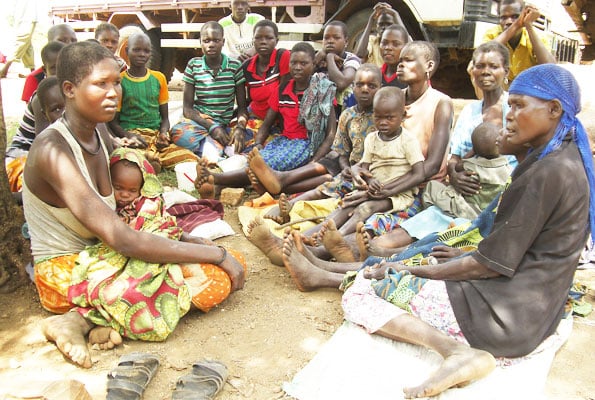Prime
Karamoja bears brunt of poverty

In this file photo, some of the Karimojong who were stopped at a checkpost in Iriri on their way to Kampala await to be transported back to their villages. PhHOTO/FILE/KATHERINE HAYWOOD.
For decades, progress has eluded the Karamoja sub-region, home to a cluster of different tribal and ethnic groups, leaving it desperately poor. With conditions so hard to bear, residents have opted for different survival measures, writes Saturday Monitor’s Katherine Haywood.
A group of dusty villagers wearing the colourful but faded traditional wraps of the proud Karamojong stand barefoot in the mud listening to the new law of the land. “Any Ugandan adult has the right to move wherever they like in the country,” a probation officer announced to the crowd of bony adults and pot-bellied toddlers, in the guttural language of the Bokora tribe. “But you need a letter from your local leader if you want to transport your children out of the region. If you transport someone else’s child you will be arrested.”
This is Naitabwei village, a pitiful speck in the vast, barren plains of Moroto District, Karamoja region, North Eastern Uganda. After trying to leave, nine children between the ages of one and 13, and three mothers, have just been returned here by police escort, apprehended at a remote police station in Iriri, on the Karamoja- Katakwi border. “My family are hungry but digging the fields here is useless, so I thought I would move away to earn some money or food,” said Nanga Martina, 38, who was travelling with her two young children three-year-old Lowal and one-year-old Lokwi to look for casual work in the cassava fields in Siroti, a neighbouring district.
No progress
In several development and economic indicators, Uganda has been forging ahead. But for decades, progress has eluded this part of the country, home to a cluster of different tribal and ethnic groups, leaving it desperately poor. UNOCHA, in its Consolidated Appeal for Uganda 2010, said, “Karamoja remains saddled with the humanitarian consequences of chronic under-development,” with limited livelihood options and negligible basic services. At least 900,000 people in the region are facing severe food insecurity due to consecutive rain failure and poor harvests over four years, the Famine Early Warning Systems Network announced last month.
Insecurity is also a push factor for these traditional herdsmen, with a culture of cattle rustling: Rampant armed violence has been aggravated with a combination of a limited justice system, competition amongst tribes for natural resources, and prevalence of illegal weapons. The Ugandan army has achieved a measure of stability with a far reaching disarmament programme, but progress has been uneven and there are still frequent reports of raids and killings.
Recently deserted homesteads of mud huts dot the landscape, their characteristic thorny perimeter fences little comfort against a live AK47. But since January this year, over 200 Karamojong, mainly from the Bokora in Moroto, have been stopped and returned to this unforgiving environment.
Officials say it is a humanitarian response to stem the flow of destitute Karamojong children onto the harsh streets of the capital Kampala and other cities to beg. “On the streets the young are not cared for. They are exploited for their ability to earn rather than attending school, girls are exploited sexually, they risk accidents from passing vehicles, their living quarters are unsafe,” said Ms Florence Kirabira, the acting head of the Child and Family Protection Unit, Uganda Police Force. The implication is that they are better off at home.
There’s no clear data on the number of out-migrants from Karamoja, but a study by German NGO ASB in 2009 found that numbers have increased in recent years. Their findings support the thesis that migrant Karamojong face poor, unsafe and unsanitary living conditions. The Feinstein International Centre at Tufts University in 2007 found an increasing trend of young people out-migrating alone to work for people with whom their families have no pre-established relations, which may suggest heightened precariousness. And there have been some incidences of direct exploitation. “Migration is being commercialised and children deployed by certain individuals who take advantage of desperate communities," said Scp Grace Turyagumanawe, the co-ordinator of Re-establishing Law and Order in Karamoja.
There have been no prosecutions for child trafficking, but last month three women and one man were charged with ‘kidnapping from lawful guardianship’ because of their suspected link to several unaccompanied teenage girls and a nine-year-old boy who were travelling in the recently blocked vehicle. However, most commentators agree that the majority of children leave with their parents or relatives, or at least with their parent’s consent.
Maria Nichiyo, 13, from Nakwakwa village, Iriri Sub-county, provides an example of the dangers that can await young migrants. Last year her mother urged her to travel to Kampala with a woman from a neighbouring village because of the lack of food and insecurity. She intended to earn some money begging, capitalising on her lame leg for pity, and return to her village.
The Shs20,000 ($5) maximum a day she could earn was far above anything achievable in Karamoja, but the woman took her earnings. “I was left with nothing. I would have to hang around the dustbins looking for scraps of food. Sometimes I wouldn’t eat at all. At least here you get some greens,” she said. These are types of stories the probation officer relates to the ragged crowd back in Naitabwei village. “Instead a child should be in school, in familiar surroundings” insisted the probation worker.
The message was received intently amid murmurs of revelation and understanding. “It is our mistake,” said one tall, lean woman, green and red beads around her neck, her dusty hair in knots. “We are sorry.” But the mood quickly turned fractious when the officials began to leave. “You have talked a lot but have you brought food?” heckled on woman. Another picked some weeds from the red/ black earth and signaled that it was her only source of nourishment. Growing angrier, she pulled her withered breast from her torn top – a stark demonstration that she could not feed her baby.
As such, there is concern in several quarters with the human rights implications of preventing poor and hungry people seeking a brighter alternative within their own country. No other ethnic group is subject to travel restrictions in Uganda.
One support worker confided that she had returned two teenagers back to a village where some elderly people had just died from starvation. “It is a fine line between people’s rights to movement and the protection of the young,” said Agnes Karani, UNICEF’s child protection specialist for Moroto.
Tufts University senior researcher Elizabeth Stites said while Karamojong out-migrants do face difficulties at their destination, it is important to remember that "seasonal migration for the semi-nomadic Karamojong has long been an integral coping mechanism appropriate to the environment". But Mr Moses Subbi, the senior district probation and social welfare officer, insists the initiative is in response to repeated community requests for assistance, which were crystallised in a district-wide consultative workshop with village elders in December.
The road block is not permanent, but mostly activated by local tip-offs that several children are leaving. “It is intelligence-led,” said Mr Subbi, “we work with the cooperation of local communities.”
Certainly, touring the scattered villages, the response is generally in favour of a mechanism by which out-migration by children, even with their guardians, is controlled. But it is always qualified by the need to couple such actions with support back in the place of origin.
Checkpoint
“The police checkpoint is a good idea because Kampala is dangerous,” said Paul Ngorok, the local chairman of Locitel village, Locopoi Sub-county, Moroto, which has seen a lot of out-migration in recent years. “But the government and NGOs should give us support so those returned don’t just leave again,” he adds, citing food, seeds, a horse, and agricultural implements as useful inputs.
Aid agencies are in agreement.
“Is Kampala the problem, or is it the solution? The problem is right here in Karamoja,” said Federico Soranzo, Karamoja co-ordinator for Co-operation and Development, one of the longest established NGOs in the region, which has been working on water and food-related interventions for 30 years, and provides a well-established child protection unit, funded by UNICEF, and in turn DfID.
For the last three years C&D has been supporting the local government respond to a national programme of returning children and some adults from the streets of Kampala, back to their villages in Karamoja, by providing development assistance for the returnees.
Women like Agnes Abura, have been provided with aid in the form of a mud hut in a protected compound, some start-up seeds and funds for textbooks for her child. But the road block comes with no funding and is the initiative of an already scantly resourced District police force – NGOs such as C&D, Save the Children and the local Catholic Mission provide basic food for those apprehended and transport for their return to their villages.
Greater attention
In the last few years, since the threat of the tyrannical Lord’s Resistance Army has receded in northern Uganda, Karamoja has received greater attention from the government, international aid agencies and NGOs, looking to help develop the area. Long standing actors such as the World Food Programme, which distributes food aid to hundreds of thousands of hungry Karamojong every year, are developing more complex but sustainable interventions in response to chronic food insecurity and economic inactivity. “So long as there is this imbalance, people will be drawn out of the area,” said Stanlake Samkange, head of WFP Uganda.
There is a long way to go and it is the second time that Nanga Martina has tried to leave her village.
The probation officer tells her that if she is caught again, she will be detained, even though she is travelling with her own children so Martina says she will now stay put in her village. Perhaps she will be able to cultivate some food, given that some rains have come this year, providing the normally scorched land with a sprinkling of green. But without sustained development the attraction of the road will still be compelling.




